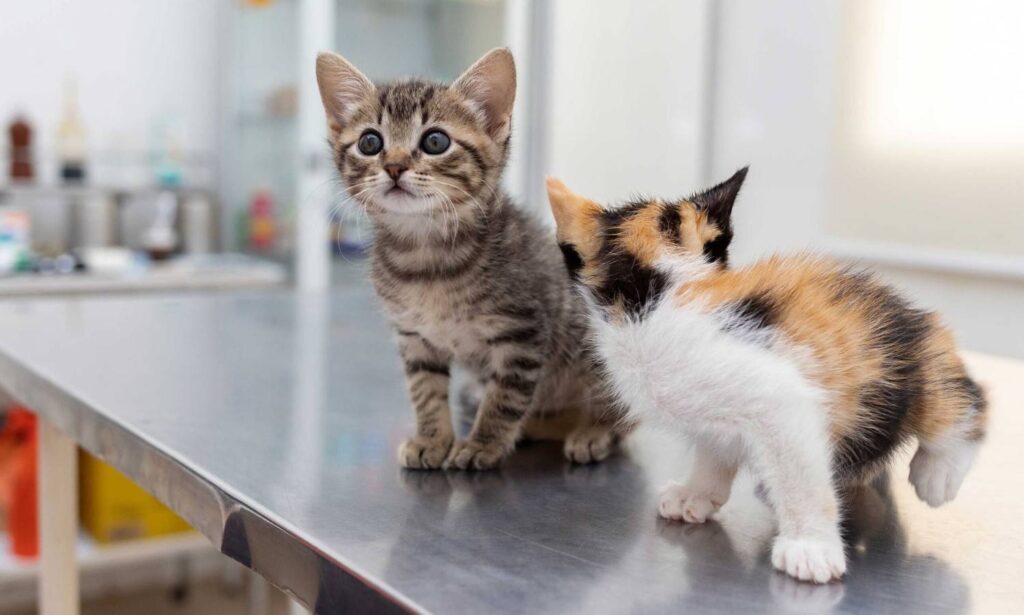Bringing a kitten into your home is exciting! Kittens are energetic, inquisitive, and affectionate. However, they also need proper care to stay healthy. One of the first questions new cat owners often ask is, when should I take my kitten to the vet? Let’s break down everything you need to know about vet visits for your kitten in an easy-to-understand way.

First Vet Visit: When and Why?
The first trip to the vet should happen shortly after you bring your kitten home, ideally within the first week. This initial visit is very important. During this check-up, the vet will:
- Make sure your kitten is healthy.
- Check for common issues like fleas or ear mites.
- Talk to you about vaccinations, diet, and overall kitten care.
Knowing when should a kitten go to the vet for the first time helps set the stage for a lifetime of good health.
Vaccinations: Protecting Your Kitten from Illness
One of the most important parts of your kitten’s vet care is vaccinations. These protect your kitten from dangerous diseases. When should I take my cat to the vet to get shots? Here’s a general timeline:
6-8 weeks old: Your kitten will get the first round of core vaccines, such as the FVRCP vaccine.
10-12 weeks old: The second round of vaccines, including the optional FeLV (feline leukemia) vaccine for at-risk kittens.
14-16 weeks old: Final doses of the FVRCP vaccine and the rabies shot.
Keeping up with this schedule is crucial. Vaccines help your kitten’s immune system fight off serious illnesses.
Newborn Kittens: When to Take Them to the Vet
If you’re caring for very young kittens, you might ask, when to take newborn kittens to vet? In general, newborn kittens should see a vet if:
- They show signs of sickness, like not eating or seeming very weak.
- They’ve been orphaned and need extra care.
- There’s any concern about their development or weight gain.
Early vet visits for newborns ensure they get the care they need to grow strong and healthy.
Signs Your Kitten Needs Immediate Vet Care
Sometimes, you can’t wait for a regular vet appointment. You need to know when should you take a kitten to the vet right away. Here are signs that your kitten needs urgent care:
- They won’t eat or drink for more than 24 hours.
- They’re vomiting or have diarrhea that lasts more than a day.
- They’re having trouble breathing or seem very weak.
- Their eyes or nose have a lot of discharge.
Contact your veterinarian right once if you observe any of these symptoms. Quick action can make a big difference in your kitten’s health.
Parasites: A Common Issue
Many kittens come into contact with parasites like fleas, ticks, or worms. You might wonder, when do you take kittens to the vet for these problems? If you see signs like itching, a swollen belly, or worms in their stool, it’s time for a vet visit.
At your kitten’s first check-up, the vet will likely start a deworming program and recommend flea prevention. These treatments help keep your kitten comfortable and healthy.
Regular Vet Visits: Keeping Your Kitten Healthy
After the first few months, regular vet visits remain important. But how often should you go? For most kittens, vets recommend check-ups every six months during their first year. These visits:
- Track your kitten’s growth and development.
- Ensure they stay up-to-date on vaccinations.
- Let the veterinarian identify any possible health problems early.
- These routine visits are essential for your kitten’s well-being.
Spaying or Neutering: Another Important Step
Spaying or neutering is another key vet visit. Most vets recommend this procedure between 4 and 6 months of age. It prevents unwanted litters and reduces the risk of some health problems, like certain cancers. Plus, it can help with behavior issues, such as spraying or marking.
Preparing for Your Vet Visit
Getting ready for a vet visit can make the experience smoother for both you and your kitten. Here are a few tips:
- Use a safe and comfortable carrier to transport your kitten.
- Bring any records you have about your kitten’s health.
- Write down any questions or concerns you want to ask the vet.
- Being prepared helps ensure you get the most out of the visit.
Conclusion
Knowing when to take kitten to vet is a big part of being a responsible pet owner. Regular check-ups, vaccinations, and staying alert to signs of illness will help your kitten thrive.
For more helpful tips on raising a healthy and happy kitten, visit Cattoptips. With proper care, your kitten will grow into a loving and healthy companion for years to come.
Frequently Asked Questions (FAQs)
1. How often should I take my kitten to the vet?
Kittens should visit the vet every 3-4 weeks for the first few months. After vaccinations and spaying/neutering, schedule check-ups every six months to monitor growth and overall health.
2. When do kittens need their first shots?
Kittens should receive their first round of vaccines between 6-8 weeks of age. This is the start of a vaccination schedule to protect them from common diseases like feline distemper and upper respiratory infections.
3. How do I know if my kitten is sick?
Signs of illness include lethargy, loss of appetite, vomiting, diarrhea, or unusual discharge from the eyes or nose. If your kitten shows any of these symptoms, take them to the vet immediately.
4. What should I bring to my kitten’s first vet visit?
Bring your kitten in a secure carrier, any medical records, and a list of questions or concerns. This helps the vet provide the best care and address all your needs.
5. Can I take my kitten outside before they’re fully vaccinated?
It’s best to keep your kitten indoors until they’ve completed their vaccinations. This reduces the risk of exposure to harmful viruses and parasites.
6. When should I spay or neuter my kitten?
Most vets recommend spaying or neutering kittens between 4-6 months old. This helps prevent unwanted litters and reduces the risk of health and behavior issues.
7. Do kittens need dental care?
Yes, dental health is crucial for kittens. During regular check-ups, your vet will check their teeth and may recommend brushing or dental treats to maintain good oral health.


